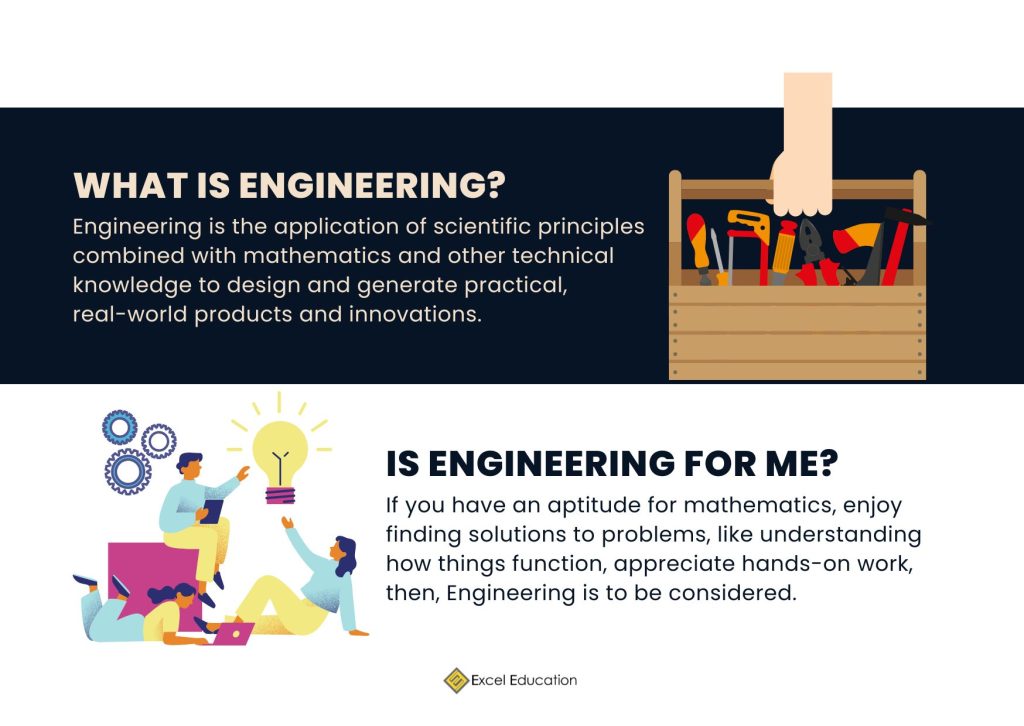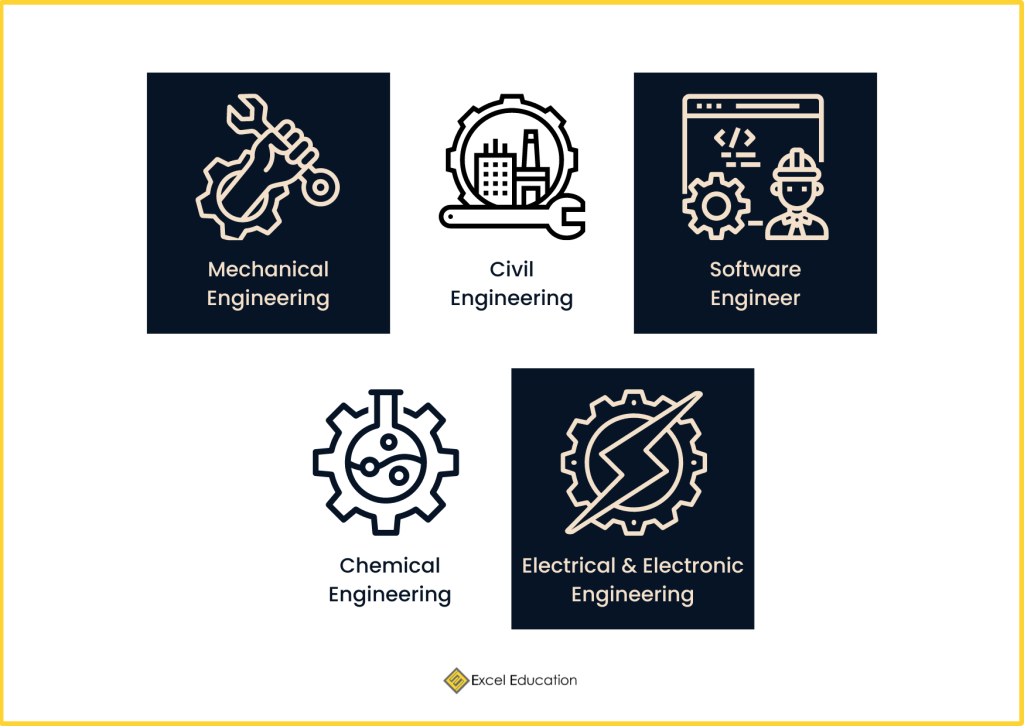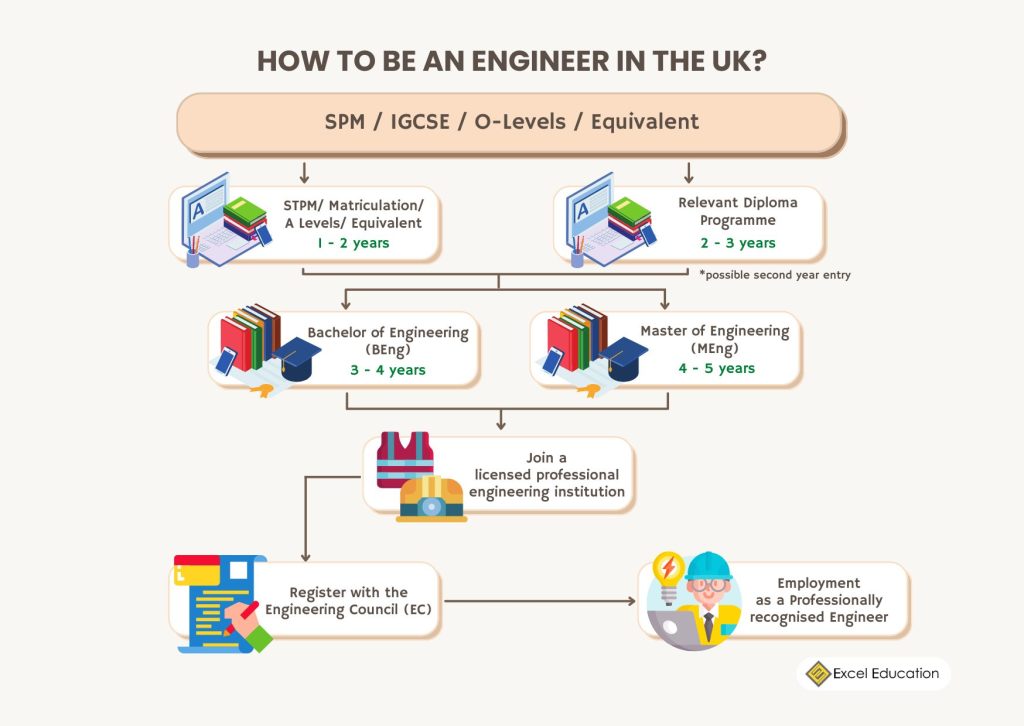
Don’t know where to start with your academic and professional Engineering journey? You’ve come to the right place. Let’s engineer your future and study Engineering at UK Universities that are highly sought by employers!
What is Engineering?

Engineering is the application of scientific principles combined with mathematics and other technical knowledge to design and generate practical, real-world products and innovations. Engineering pioneers innovative problem solving to sustain industrial and technological advancement of the world.
Engineering as a sector is dynamic with relevance in multiple areas of disciplines and specialisations. As such, professionals of Engineering, or Engineers have varied duties and responsibilities depending on their role and the field of Engineering they are in. However, Engineers are essentially problem-solvers navigating the solutions to issues either in infrastructure, construction, electronics, chemicals, softwares, among many others.
“Is Engineering for me?”, you ask. Well, if you have an aptitude for mathematics, enjoy finding solutions to problems, like understanding how things work or function, appreciate hands-on work, and ultimately, want to make a difference, then Engineering is to be considered.
Types of Engineering

Types of Engineering | Description |
Mechanical Engineering | Mechanical Engineering is one of the principal branches of Engineering. In fact, it is one of the most broad Engineering disciplines. Mechanical Engineering focuses on the design, construction, operation, and testing of mechanical systems and machinery. Some examples of subjects in a Mechanical Engineering course include Mechanical Engineering Design, Thermodynamics, Automation and AI, among many other relevant subjects. Mechanical Engineering can lead to a variety of careers, including in sectors like manufacturing, aerospace robotics, and hardware engineering. |
Civil Engineering | Civil Engineering is one of the oldest forms of Engineering. Civil Engineering centres on the design, construction, and maintenance of human-made structures, such as highways, bridges, tunnels, buildings, or water treatment facilities. A Civil Engineering course can include subjects such as Structural Analysis and Design, Soil Mechanics, Geotechnical Engineering, and even Sustainable Architecture. Civil Engineering graduates can enter various professional fields including construction and infrastructure management, consulting, and public works. |
Software Engineering | Software Engineering is a branch of Engineering relating to software applications, information or computer-based systems, and networks. Software Engineering concentrates on the design, development, testing, and maintenance of software applications like computer games, operating systems, or financial systems. Prospective students of Software Engineering programmes would possibly learn subjects such as Computation, Operating Systems, Data Structures and Algorithms, Machine Learning, and Programming. Industries that can be ventured for Software Engineering graduates include telecommunications, aviation, finance, software development, security, and many more. |
Chemical Engineering | Chemical Engineering integrates principles from diverse sciences like physics, chemistry, microbiology, and applied mathematics to create, transport, and effectively utilise chemicals, materials, and energy. Chemical Engineering finds application in the production of fibres for clothing, the formulation of soaps and detergents, the development of dyes, and the creation of food preservatives. Chemical Engineering programmes incorporate subjects such as Chemical Reaction Engineering, Heat and Mass Transfer, Process Design and Analysis, and even Sustainable Process Engineering. Some career options under this field are as a Process Engineer, Biochemical Engineering, Food Processing Expert, and Pharmaceutical Engineer. |
Electrical and Electronic Engineering (EEE) | Electrical and Electronic Engineering design, plan, research, evaluate, and test electrical and electronic equipment and systems. The field is responsible for electrical and electronic circuits, components, systems, and equipment, such as radar and navigation systems, communications systems, power generation equipment, or the electrical systems of automobiles and aircraft. Subjects that are typically found in Electrical and Electronic Engineering include Computer Programming, Digital Circuits and Systems, Communication Systems, Electromagnetics, and Applied Machine Learning. Career prospects under Electrical and Electronic Engineering are found in areas such as software development, fibre optic and mobile communications, aerospace technology, automotive systems and renewable energy technologies. |
Skills Required to Study Engineering

- Engineering Software Skills
Familiarising yourself with Engineering softwares is a great step to take to further enhance your skills during your Engineering studies. Especially because knowledge on the usage of these Engineering softwares is necessary when you step into the professional field of Engineering.
- Affinity for Numerics & Science
An affinity for numerics and science would majorly benefit those wanting to pursue Engineering because a majority of the courses or classes included in an Engineering programme will be derivations of maths and/or science – not to mention, Mathematics is a requirement to enter an Engineering programme.
- Test Method Development
Engineering industries centre on problem solving where testing is an integral aspect. Testing in labs during your Engineering studies may feel tedious but it is a great opportunity to learn and practice before you step into the professional field of Engineering.
- Programming Language Knowledge
In Engineering, courses and subjects where you have to learn coding or programming is something you would definitely have to expect. On this account, knowledge of programming languages is necessary in ensuring you can keep up with peers and classes in an Engineering course.
- Educational Commitment
Engineering is a dynamic field where advancements are consistently generated. Hence, keeping committed and up to date with learning about new additions in the Engineering field is admirable and favourable.
Career Opportunity upon Graduation
Listed below are some career options for Engineering graduates. Do note that there are various career options depending on specific branches of Engineering.
- Civil Engineer
- Engineering Project Manager
- Project Engineer
- Information Technology Professional
- Mechanical Engineer
- Programmer
- Product Engineer
- Software Developer
- Hardware Engineer
- Engineering Lecturer
Engineering allows for versatile job opportunities which are also profitable. Salaries may vary depending on several factors including the industry you decide to go into and relevant Engineering experiences. However, it is reported in May 2024 that the average annual salary for an Engineer in the UK is £39,089.
General Entry Requirements to Study Engineering in the UK
Academic Entry
Academic Entry | Minimum Score |
A-Levels | AAB – ABB (With A-Level Mathematics and Science Subject) |
IB Diploma | 32 (With Mathematics) |
UEC | AAABB (With Mathematics) |
STPM | ABB (With Mathematics and Science Subject) |
Matriculation | CGPA 3.00 |
Australian Matriculation (ATAR) | 88 |
Canadian Pre-University (CPU) | 82% |
Note: Universities may have different requirements. To learn more, get in touch with us!
English Language Entry Requirements
Entry Level | Minimum Score |
IELTS | 6.5 |
TOEFL | 90 |
Pearson Test of English (PTE) | 67 |
SPM 1119 | C |
Note: Universities may have different requirements. To learn more, get in touch with us!
How to be an Engineer in the UK?

In order to professionally practise as an Engineer in the UK, here are some steps to take:
Step 1: After SPM or equivalent examinations, complete a pre-university programme which grants you entry into Engineering programmes in the UK. Typically you’d need Mathematics, a Science subject, and English. Depending on which type of Engineering you want to enrol in, there may be additional requirements.
Once you have finished SPM and decide to enrol into a Diploma programme taking up to 2-3 years, you may gain entry into the second year of an Engineering undergraduate degree. This is significantly dependent on the university that you are enrolled in and the grades you have upon completion.
Step 2: Enrol into an Engineering degree. You have options to enrol in various branches of Engineering – civil, chemical, mechanical, electrical, and several others. You could consider enrolling into either a Bachelor of Engineering (BEng) or a Master of Engineering (MEng).
Difference between these two is that:
- MEng is an undergraduate course with an integrated Master’s.
- BEng has a duration of 3 years (4 years with placement) while MEng has a duration of 4 years (5 years with placement).
- BEng graduates can become Incorporated Engineers (IEng), however MEng graduates go on to become Chartered Engineers (CEng) because becoming a chartered engineer requires four years of study. BEng graduates would have to complete a Master’s if they want to practise with the CEng title.
Step 3: Join a professional engineering institution licensed by the Engineering Council. You can also do this while doing your Engineering programme. In this stage, you should build your portfolio and boost professional developments.
Step 4: Meet the registration criterias and register with the Engineering Council.
Step 5: Join employment as a professionally recognised Engineer with an appropriate title.
An additional information for those wanting to practise in Malaysia, Board of Engineers Malaysia (BEM) recognises the Engineering Council (EC) as a professional body. Both bodies are signatories of the Washington Accord. Thus, those who were granted an accredited degree by BEM can also register with EC.
Study Engineering at UK Universities that are Highly Sought by Employers
There are many specialisations or focused study areas of Engineering you can pursue which are sought after by employers with options in either Bachelor of Engineering (BEng) programmes or Master of Engineering (MEng) programmes. However, this section focuses on Bachelor of Engineering (BEng) programmes rather than Master of Engineering (MEng) programmes.
Here is our list of recommended UK Universities that are highly sought by employers for Engineering study programmes. Data for universities and employers are retrieved here.
1. University of Warwick

The University of Warwick, founded in 1965, is an esteemed public higher education learning institution located in the outskirts of Coventry, England. Warwick’s academic excellence shines through their rank in the 10th spot among universities in the UK and the top 70 among universities globally for the year of 2024.
Also, for the Engineering and Technology subject of 2024, the University of Warwick was placed in the top 15 ranks among universities in the UK, making it a reputable learning institution for those looking for an Engineering degree in the UK. Warwick extends Engineering programmes which incorporates comprehensive curriculums with opportunities for studying abroad, industrial placements, or work in research
Programme Offered | Engineering BEng Study Disciplines:
|
Duration | 3 or 4 Years |
Intake | September |
Annual Indicative Fees (2024) | International Students: £31,620 |
Disclaimer: An additional year of study duration includes an industrial/professional placement or a year of study abroad.
Contact us right now for a free consultation if you’d like more details about the costs, the format of the programme, and the entry requirements!
2. University of Leeds

The University of Leeds, established in 1874, is a public higher education learning institution based in England. Leeds is a member of the prestigious Russell Group of the UK with ranking amongst the top 100 of universities worldwide. Leeds is home to many student unions and clubs to make your university life a memorable one.
The University of Leeds offers comprehensive Engineering programmes, proven through their ranks in the top 10 for the Engineering and Technology subject for the year of 2024. Prospective students have access to accredited Engineering programmes, yearly project work, industrial work placement and study abroad opportunities, as well as student support through student societies and personal tutors.
Programme Offered | Bachelor of Engineering (BEng) Study Disciplines:
|
Duration | 3 or 4 Years |
Intake | September |
Annual Indicative Fees (2024) | International Students: £30,250 |
Disclaimer: An additional year of study duration includes an industrial/professional placement or a year of study abroad.
Contact us right now for a free consultation if you’d like more details about the costs, the format of the programme, and the entry requirements!
3.. University of Bristol

The University of Bristol has history rooting all the way back to the year 1595. The University of Bristol is a renowned higher education learning institution in the UK, known to be a member of the Russell Group universities. Among universities globally, Bristol is ranked 55th for the year of 2024, marking its international reputation.
Engineering programmes offered by the University of Bristol permits students with four broad Engineering disciplines, where curriculums are professionally accredited with opportunities for students to experience project-based learning approaches alongside global Engineering challenges, industrial placement, and study abroad opportunities. In 2024, the University of Bristol was ranked in the top 15 among UK universities for the Engineering and Technology subject.
Programme Offered | Bachelor of Engineering (BEng) Study Disciplines:
|
Duration | 3 or 4 Years |
Intake | January, September |
Annual Indicative Fees (2024) | International Students: £29,300 |
Note: BEng Aerospace Engineering and BEng Engineering Mathematics has an annual indicative fee (2024) of: £31,300.
Disclaimer: An additional year of study duration includes an industrial/professional placement or a year of study abroad.
Contact us right now for a free consultation if you’d like more details about the costs, the format of the programme, and the entry requirements!
4. University of Nottingham

The University of Nottingham is a well-known tertiary education institution not only in the UK, but also globally. Considering their status as a member of the UK’s prestigious Russell Group and the Universitas 21 international network, with campuses in the UK, China and Malaysia, the University of Nottingham is a suitable study destination for those looking to study Engineering in the UK.
For the Engineering and Technology subject in 2024, the University of Nottingham ranks in the top 10 among universities in the UK. Engineering programmes of the university also imbues lab-based projects in learning alongside opportunities for a year abroad or a year in industry.
Programme Offered | Bachelor of Engineering (BEng) with Honours Study Disciplines:
|
Duration | 3 or 4 Years |
Intake | September |
Annual Indicative Fees (2024) | International Students: £28,600 |
Disclaimer: An additional year of study duration includes an industrial/professional placement or a year of study abroad.
Contact us right now for a free consultation if you’d like more details about the costs, the format of the programme, and the entry requirements!
5. University of Birmingham

The University of Birmingham, sometimes known as Birmingham University, was founded in 1825 and has since established itself as a well-known public research university in the United Kingdom. The institution retains its position as the original ‘redbrick’ university with membership of the UK’s esteemed Russell Group. If you want to study Engineering in Britain’s second largest city, the University of Birmingham is the place for you.
The Engineering courses at the University of Birmingham allow students to explore Engineering topics before determining which Engineering specialty to pursue. In addition, the University of Birmingham is ranked in the top twenty of UK universities for Engineering and Technology in 2024.
Programme Offered | Engineering BEng Study Disciplines:
|
Duration | 3 or 4 Years |
Intake | September |
Annual Indicative Fees (2024) | International Students: £28,560 |
Disclaimer: An additional year of study duration includes an industrial/professional placement or a year of study abroad.
Contact us right now for a free consultation if you’d like more details about the costs, the format of the programme, and the entry requirements!
For more information regarding the university, programme offered, entry requirements and fees, contact Excel Education.
About The Author

Hannah Hir
Hannah appreciates various art forms, especially Asian literature, film and music. Most of her favorite Malaysian kuihs are green-coloured.

